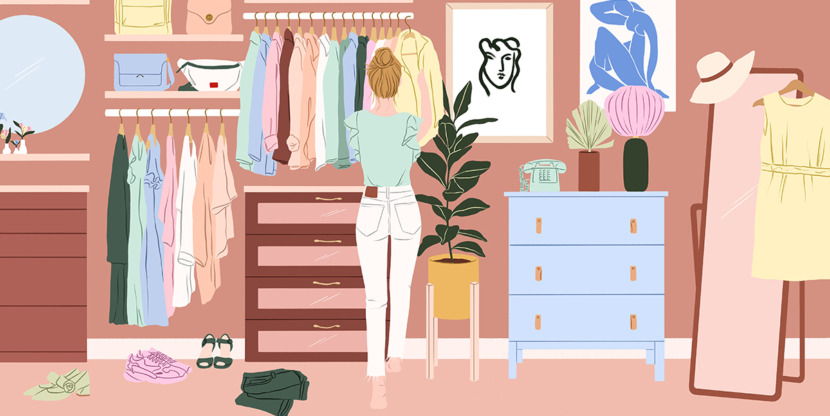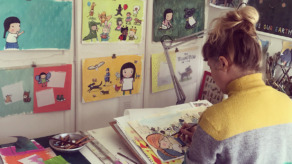The point of doing ‘pointless’ things

Doing something for yourself, just because you enjoy it and without there having to be any purpose to it. In times of great uncertainty this can prove to bring valuable moments of comfort.
Suddenly, during the COVID-19 pandemic, many of us found ourselves confined at home. Some could continue to work from home, others were unable to do so because they run a store, café or hairdresser’s, for example. This period of self-isolation made us rethink our purpose and meaning.
But very often we simply had to beat boredom and started solving sudoku puzzles, piecing jigsaw puzzles together and playing board games again. Doing those things made us remember what we used to love about them: they relax us. Plus: these are moments solely for ourselves.
And yet, in the distance you can always hear that nagging voice: ‘Isn’t it better to do something useful?’ Maybe it is, you think, because, after all, you do feel satisfied and proud at the end of a very productive day. Working hard brings many rewards. Life is full of opportunities and you have to seize them.
For some, their religious upbringing may have something to do with their mindset: Working is often seen as a virtue and laziness is sinful. The harder you work, the better you are. Of course, you know you can’t always be busy. But still, if you just tidy the shed first, you’ll feel less stressed the next time you curl up on the couch to read a book.
Stagnation
Achievements are rewarded, and that starts early in life. From your shoe-lacing certificate in kindergarten to a gold sticker for tidying up your room, from a complimentary remark from the teacher on the back of a beautiful drawing to a trip to the ice-cream parlor as a reward for a good report card: That’s how we learned what was expected of us.
Once we grew up, life didn’t turn out to be much different, and we learned to deal with economic growth, profit maximization, competition and a drive for more achievements. Stagnation would lead to decline.
Useless relaxation
“Feeling useful actually means working toward a goal that is important to you, and that is almost always something outside of yourself,” explains personal coach Inger Strietman. “We often behave in the so-called right way because we think that’s how it’s done. Putting yourself first is not nice, for example, because that is antisocial.
And when we have time for ourselves, we become very pragmatic. Where it’s fine when you’re together with others to simply have fun, on your own you suddenly have to do something useful: You start cleaning up, making plans for your vacation or updating your LinkedIn profile. But ‘useless’ relaxation is just as important.”
That higher goal is not necessarily ‘wanting to be useful’, it is about something much bigger: wanting to receive recognition and appreciation. After a weekend of Netflixing on your own, that’s not what you’re going to get.
Nagging Guilt
“That’s where the nagging guilt comes from,” Strietman says. “At that moment, you are not contributing to what you think you should.” It is also called ‘Productivity Guilt’: Your existence has become such a well-oiled machine of efficiency that you can barely sit still on your day off to even read a section of the weekend newspaper at your leisure. There is always something to do.
Scientific research proves that this sense of guilt not only prevents us from feeling happy, it also hampers our performance and reduces concentration and creativity. By postponing your happiness until you have achieved something, you give yourself the feeling that you are not good enough in this moment.
Time for Amazement
For inventor and YouTube star Simone Giertz, it was an important discovery to find out that you don’t always have to be doing something practical. From an early age, she had been very ambitious, and during her studies she only got the highest marks. At the same time, she suffered from severe fear of failure; she was afraid of not meeting her own high expectations.
When, at the age of 23, she became interested in robot technology, the complexity of it scared her off. But she came up with a solution—one in which it was impossible to fail, precisely because failure was the actual goal. She started inventing useless robots: devices that nobody was waiting for, such as a tooth-brushing helmet with the brush flopping back and forth against her nose. Or a robot for lazy people that feeds you your soup—but spills it everywhere.
Performance anxiety
“For the first time in my life, I did not have to deal with my performance anxiety,” she says in her much-viewed and humorous TED Talk ‘Why You Should Make Useless Things’. “And as soon as I removed all pressure and expectations from myself, that pressure quickly got replaced by enthusiasm, and it allowed me to just play.”
Giertz’ videos have grown into a YouTube channel with more than two million subscribers. So in this way, it has even turned into a good career for her, perhaps precisely because that was never her intention.
“We’re busy setting priorities all day long, and we are very good at that. If you don’t watch out, your life becomes one big to-do list,” says author and executive coach Danielle Marchant. She was in her early 30s when she was working as a managing director for an international company in Singapore.
With a good salary and lots of responsibilities, she loved her job—until she burned out. A retreat lasting several months at a farm in Cornwall, UK, taught her how important it is to create moments where you don’t expect anything from yourself. “You could call them useless, but I’d rather see them as empty space,” she says. “If you do not plan every minute of your day full of so-called useful activities, there is room for wonder and surprise. Those are the moments when creativity comes to you.”
Inspired
Some time ago she was back in Singapore for a short visit. She explains how very different it felt to her this time when she was sitting on a bench. “Instead of scrolling through Instagram, I just sat there and looked around me, at the buildings and the people,” she says.
“As I walked on, I noticed all kinds of questions suddenly flashing through my mind about what I was going to do in the coming months. Questions that I had not paid attention to for too long, but that were very important. Even though you’d think sitting on a bench in the middle of a busy city seems like the last place to be inspired.”
Daydream Mode
In Pause, the book Marchant wrote to help others cope with performance pressure, she writes that it is especially in fast-paced times that it’s most important to slow down. She believes that such times are often uncomfortable, because we want to ‘do’ something, anything, but that the longer we rest, the closer we get to ourselves. It is easy, she writes, to get carried away in the chaos and pace of things and to forget yourself and what you really want.
A non-activity, as neuroscientist Henning Beck calls it in his book, Scatterbrain. While carrying out a monotonous, low-stress activity, you give the hard-working part of your brain a break—the so-called ‘default network’ takes over. At such a moment, you find yourself in a kind of daydream mode and you sometimes have the very best ideas.
As examples of non-activity, Beck lists knitting, coloring or collecting shells on the beach. So, basically, you should take up a hobby, the perfect form of non-activity. But that may lead to a different problem, if you want to then become quite good at it. If you sign up for a pottery course, you secretly expect that you’ll make at least three arty mugs that you can show off on your table and use. Or you’ll want to buy the most complicated jigsaw puzzle in the store—as if it otherwise wouldn’t count.
Fanatic
Cabaret performer and author Janneke de Bijl recognizes this. “After I played tennis once with my in-laws during a vacation, I liked it so much that I kept doing it,” she says. “At the same time, I felt disappointed because I had started so late in life. But why? Would I have wanted to play at Wimbledon?
I develop that tendency to want to become good at something very quickly. It was the same with painting lessons. I wanted an assignment from the teacher every day so that I would get better quickly. Until a friend said, ‘Gosh, you’re such a fanatic again’.
Now I’m trying really hard to see tennis and painting as things that have no purpose, apart from forgetting time and being absorbed by them. But it’s still very difficult. Social media also give you the feeling that it only counts if it is good enough to share. But who wants to see a video of me playing mediocre tennis?”
Twilighting
Doing a completely useless thing is not actually possible. Even if you take away the need to achieve something, you are often still left wanting to do something just because it’s nice; because it makes you feel good. But that doesn’t fix the nagging guilt we often have as we’re pottering about.
But, according to social psychologist Wijnand Van Tilburg, who conducts research at King’s College in London, UK, into the way we deal with boredom, experiencing an unpleasant emotion does not have to be negative. “Studies show that pointlessness is a very good motivator toward doing something useful afterward,” he says, “to ‘make up for it’ as it were.”
What is confusing is that what one person experiences as useless can be extremely useful for the other. It used to be very normal to ‘twilight’. At dusk, when all the chores were done on the farm, people sat on a bench and enjoyed the nightfall and the silence.
In the present time, we rarely take a break for that longor it has to go together with something ‘more meaningful’, such as practicing yoga or going on a silence retreat. Cultural differences also play a big part, says Strietman. “Some find a siesta quite useless, and something such as meditating is the first thing dropped from our schedules when we are busy,” she says, “while in the East it’s normal to keep that on as a priority.”
Never a waste of time
When Danielle Marchant went for a walk in Singapore as part of her morning routine, she noticed that many people in the park were practicing their own rituals—from tai-chi to the swinging of traditional fans. “Especially the elderly, though,” she says. “I didn’t see anybody in their 20s or 30s. It seems as if the older generation understands the value of things with less tangible or visible results. One of the things that someone told me is: ‘Wasting time isn’t a waste of time’.”
Want to know more?
- Pause: How to Press Pause Before Life Does It for You, by Danielle Marchant
- Scatterbrain: How the Mind’s Mistakes Make Humans Creative, Innovative, and Successful, by Henning Beck
- Youtube.com/simonegiertz: videos of the ‘shitty robots’ made by inventor Simone Giertz
Text Hedwig Wiebes Illustrations Ana Hard







